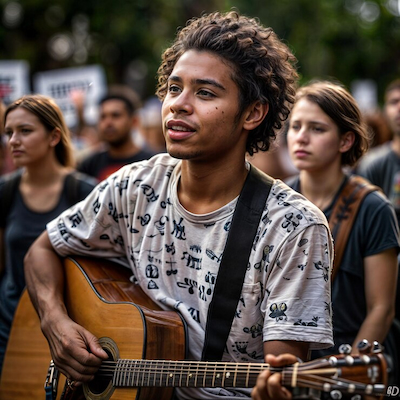
Throughout history, music has proven to be more than just a form of entertainment—it is a powerful tool for protest, a symbol of resistance, and a vital expression of cultural identity. In the context of social movements, music plays a crucial role in uniting communities, amplifying marginalized voices, and inspiring collective action.
Whether performed in the streets during demonstrations or shared online to raise awareness, songs have the ability to express complex emotions and ideals in ways that resonate deeply. This article explores how music functions within social movements, the advantages of using it as a protest tool, and how it continues to empower resistance and cultural expression across the world.
How Social Movements Operate Through Music
Social movements have a unique ability to mobilize people around shared causes, and music plays a fundamental role in this process. Through melodies, lyrics, and rhythms, music can convey powerful messages that resonate with people’s experiences and emotions. When individuals unite around a song that expresses their struggles, they not only connect with each other but also create a sense of community and solidarity. Music becomes a vehicle for expressing discontent and a call to action, strengthening participants’ determination.
Moreover, music has the capacity to transcend cultural and linguistic barriers, enabling people from different backgrounds to unite around a common cause. In many cases, protest songs become anthems that symbolize resistance and the fight for justice. As these songs are repeated and popularized, they become part of the movement’s identity, helping to shape its narrative. In this way, music not only documents the history of social movements but also influences it, contributing to the formation of collective consciousness.
Through festivals, concerts, and public events, music can also serve as a platform to amplify marginalized voices. Artists and musicians often use their platforms to highlight social, political, and economic issues, bringing attention to themes that are frequently overlooked by mainstream media. Music, therefore, is not just entertainment, but a powerful tool of activism that can inspire meaningful change in society.
In summary, social movements use music as a form of expression and mobilization, creating an emotional connection that can be crucial to the success of their causes. Through music, individuals feel encouraged to unite and fight for a better future, making art an essential part of the struggle for justice and equality.

Advantages of Using Music as a Form of Protest
One of the main advantages of using music as a form of protest is its ability to bring people together around a shared cause. When individuals from different backgrounds and experiences come together to sing a protest song, they create a sense of belonging and solidarity. This unity is essential for the effectiveness of a social movement, as it strengthens participants’ resolve and increases the visibility of the cause. Music acts as a catalyst, helping to turn frustration and indignation into collective action.
Another significant advantage is music’s ability to communicate complex messages in an accessible and memorable way. Song lyrics can encapsulate feelings of injustice and oppression in a way that deeply resonates with people. This makes the movement’s message easier to understand and remember, which is crucial in a world where attention is often fragmented. Additionally, the repetition of protest songs at events and demonstrations helps to solidify the message in the public’s mind, making it part of the cultural narrative.
Music can also serve as a form of cultural resistance, preserving the history and experiences of marginalized groups. In many cases, protest songs are based on cultural traditions and may include elements of folklore and popular music. This not only enriches the experience of the movement but also ensures that the voices of the oppressed are heard and acknowledged. Music becomes an act of resistance, challenging dominant narratives and affirming the cultural identity of groups fighting for justice.
Finally, music can inspire concrete actions and large-scale mobilizations. Through events such as benefit concerts and music festivals, artists and activists can raise funds and increase awareness about social issues. The combination of entertainment and activism creates a powerful platform to engage the public and encourage active participation in the fight for change. Thus, music is not only a form of protest but also a multifaceted tool that can drive social action and promote transformation.
How Music Can Drive Cultural Resistance
- Music as a tool for social mobilization
Music has the power to bring people together around a common cause, creating a sense of community and solidarity. In protests and demonstrations, songs of resistance are often sung, uniting voices in a harmony of struggle and hope. This mobilization becomes even stronger when the songs are well-known and loved by the public, which helps increase participation and engagement. - Protest songs that made history
Throughout history, various protest songs have become iconic in social movements. From “We Shall Overcome,” which became an anthem of the Civil Rights Movement in the United States, to “A Banda” by Chico Buarque, a symbol of resistance during the military dictatorship in Brazil, these songs capture the essence of struggle and the hopeful pursuit of justice. - The influence of music on cultural identity
Music plays a crucial role in shaping the cultural identity of a group. In many cases, protest songs reflect the experiences and struggles of marginalized communities, helping to preserve their history and culture. This artistic expression strengthens collective identity and promotes a sense of belonging among community members. - Music and activism: a powerful connection
The relationship between music and activism is deep and multifaceted. Artists and musicians often use their platforms to address social and political issues, becoming spokespersons for their communities. This connection between art and activism not only enriches the music but also amplifies the voices of the oppressed, creating a lasting impact on society. - Sounds of struggle and their significance
The sounds of struggle, spanning various musical genres, go beyond mere entertainment. They carry profound meanings and often reflect resistance against oppression. The diversity of musical styles allows different communities to express their struggles in unique ways, enriching the cultural and social landscape. - Artistic expression in contemporary protests
In contemporary protests, music continues to play a vital role. From demonstrations against racial inequality to environmental movements, music is a form of expression that resonates with people’s emotions and aspirations. Through songs and live performances, artists and activists continue to inspire the fight for a more just and equal world. - Music, therefore, is a powerful force that can drive both cultural and social resistance. It not only documents humanity’s struggles but also celebrates them, creating an emotional connection that can be transformative. In a world where the voices of the oppressed are often silenced, music rises as a beacon of hope and resistance.

Did You Enjoy Learning About Music in Social Movements: Protest, Resistance, and Culture?
Music is a powerful tool that can unite people around common causes, inspiring the fight for justice and equality. Throughout history, it has proven essential in social mobilization, cultural preservation, and artistic expression, creating a lasting impact on society.
We hope this article has sparked your interest in the relationship between music and social movements. As a form of protest and resistance, music continues to play a vital role in our lives, shaping culture and inspiring change. Explore more about this fascinating subject and discover how music can help transform realities.
Frequently Asked Questions
How does music influence social movements?
Music gives voice to struggles and feelings. It brings people together and creates a powerful message. When you hear a song, you can feel the emotion and energy of the protest.
What are some examples of protest songs?
There are many famous songs! “Imagine” by John Lennon and “A Banda” by Chico Buarque are great examples. They talk about peace and freedom. Have you heard any of them?
How does music help with resistance?
Music brings hope and strength. In hard times, it motivates people to keep going. It makes you feel part of something bigger and stronger.
Why is music part of the culture of social movements?
Music is the soul of any culture. It expresses ideas, stories, and emotions. In social movements, music tells the story of the people’s struggle and resistance. Have you ever used a song to express how you feel?
How can I use music to support social causes?
You can share songs that speak about these causes! Listen to artists who fight for rights. Spread the message and help raise awareness about the importance of music in social movements: protest, resistance, and culture.

